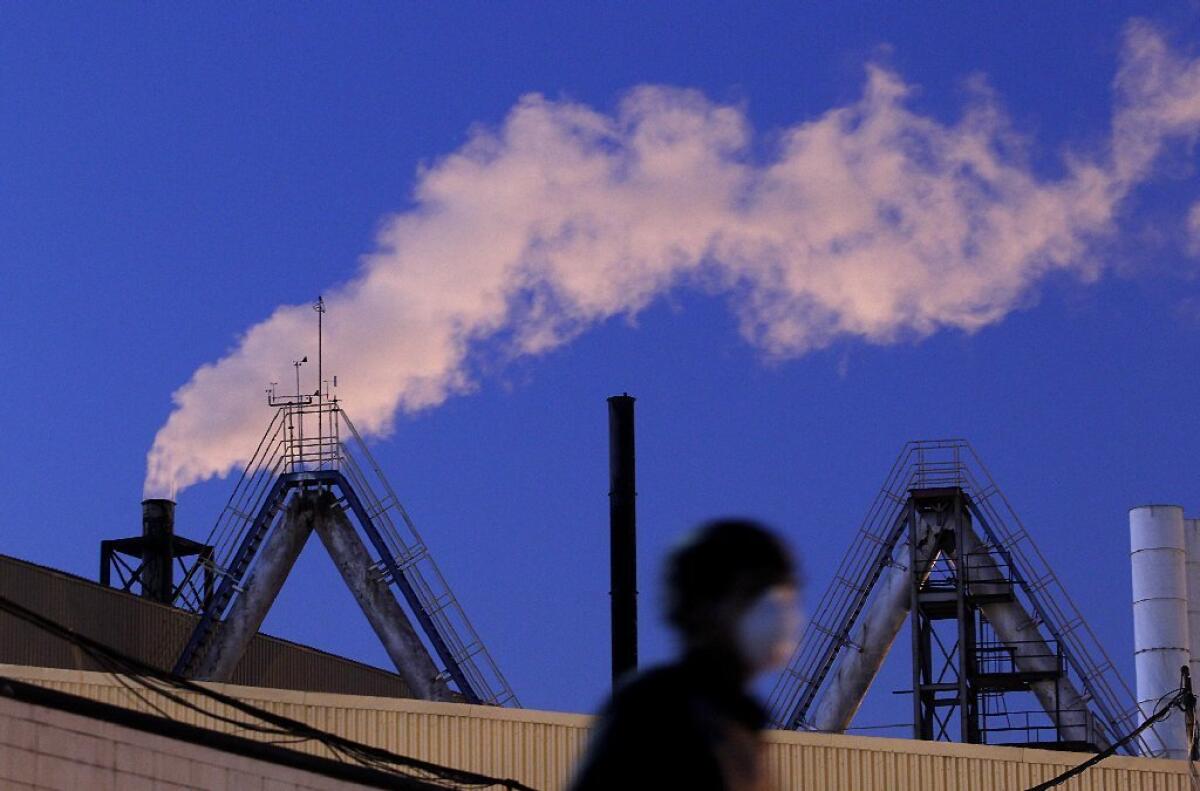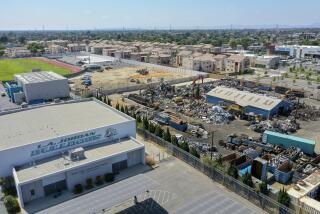Exide closing Vernon plant to avoid criminal prosecution

- Share via
Battery recycler Exide Technologies will permanently close its Vernon plant and avoid criminal charges under an agreement between the company and the U.S. attorney’s office reached Wednesday night.
Under the deal, Exide will acknowledge criminal conduct, including the illegal storage and transportation of hazardous waste, but will avoid prosecution in exchange for shutting down, demolishing and cleaning its 15-acre battery recycling plant about five miles southeast of downtown Los Angeles, according to a person involved in the negotiations.
The facility, one of only two battery recycling plants west of the Rocky Mountains, has stoked outrage among community groups and elected officials for its long history of violating air pollution standards and hazardous waste laws.
The closure marks a major victory for residents of the working-class neighborhood near the plant, who had raised concerns about pollution and demanded action against Exide. A 2013 report released by the South Coast Air Quality Management District found Exide’s arsenic emissions endangered the health of 110,000 people who live near the plant.
A company spokeswoman reached late Wednesday did not have immediate comment.
Over decades of operation, the facility has polluted the soil beneath it with high levels of lead, arsenic, cadmium and other toxic metals, state environmental records show. It has fouled groundwater, released battery acid onto roads and contaminated homes and yards in surrounding communities with lead emissions.
The agreement with federal officials is intended to allow Exide to continue operating as a viable company — it recycles batteries at facilities in Missouri and Indiana — so that it can pay for cleanup of the Vernon facility and surrounding neighborhoods, according to the person involved with the negotiations. The Georgia company, one of the world’s largest lead-acid battery recyclers and manufacturers, is in Chapter 11 bankruptcy and has filed plans to to emerge as a reorganized company. A hearing in the bankruptcy case is scheduled for March 27.
A key factor driving the agreement in the case, which was forged during negotiations in recent days, was a condition of the company’s reorganization plan that said the company could be liquidated if there was criminal prosecution.
Exide’s battery plants have left a similar legacy of pollution and health concerns across the country.
Since 2012, the company has closed or halted lead recycling operations in Pennsylvania and Texas in the face of pressure from regulators and surrounding residents.
Exide will be held to an agreement made last fall with state regulators that requires the company to set aside $38.6 million for closure and cleanup of the facility and to place $9 million in a trust fund to clean lead-tainted soil from surrounding homes. Those payments will be expedited under the agreement with federal officials.
If Exide violates terms of the agreement in the next 10 years, it could face criminal charges.
The wide-ranging federal criminal investigation into the company — first disclosed publicly in August — involved its air emissions and transportation of hazardous waste. The U.S. Environmental Protection Agency and the U.S. Department of Transportation were also involved in the investigation.
The Vernon plant, which can melt tens of thousands of car batteries a day to provide a source of lead for new batteries, has sat idle for the last year because it could not comply with air quality standards.
The facility had been allowed to operate for decades with only a temporary permit from the state Department of Toxic Substances Control.
The facily has operated in Vernon since 1922 and was taken over by Exide in 2000. The company has repeatedly been cited for violations of environmental regulations by state and local officials in recent years.
Following public outcry, Gov. Jerry Brown last year signed a law requiring regulators to either issue Exide a full permit by the end of 2015 or force the facility to close. Toxic substances department officials had said recently they were reviewing the company’s application.
Twitter: @tonybarboza
More to Read
Sign up for Essential California
The most important California stories and recommendations in your inbox every morning.
You may occasionally receive promotional content from the Los Angeles Times.











